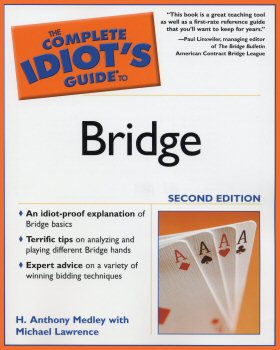| The first edition of Complete Idiot's Guide to Bridge by H. Anthony Medley was the fastest selling beginning bridge book, going through more than 10 printings. This updated Second Edition includes some modern advanced bidding systems and conventions, like Two over One, a system used by many modern tournament players, Roman Key Card Blackwood, New Minor Forcing, Reverse Drury, Forcing No Trump, and others. Also included is a detailed Guide to Bids and Responses, along with the most detailed, 12-page Glossary ever published, as well as examples to make learning the game even easier. Click book to order. | ||
| Cadillac Records (7/10) by Tony Medley Run Time 108 minutes. In 1947 Polish émigré Leonard Chess (Adrien Brody) opened a bar on the South Side of Chicago and hired a blues combo that included soft-spoken, thoughtful guitar prodigy Muddy Waters (Jeffrey Wright) and temperamental, high strung harmonica player, Little Walter (Columbus Short). From this start, Chess arranged to have them recorded and eventually opened his own studio and recorded the first of the black blues and rock ‘n’ roll stars like Chuck Berry (Mos Def) and Etta James (Beyoncé Knowles). This film chronicles the problems he faced, especially with the personalities of the talent whose recordings he produced. Although the actors are all professional singers in their own right, I have the same criticism of this film, that is filled with snippets of music, that I have had of recent musical biopics. Maybe it’s understandable, since Beyoncé is the executive producer, but they all use their own voices instead of mouthing to the great singers they are portraying. I’m sorry, but I don’t want to hear Mos Def cover Chuck Berry. I want to hear the real thing. Beyoncé is a terrific singer, but I want to hear James herself. I would especially have liked to have heard her classic hit, “At Last,” sung by her. Even worse, however, is that only a few songs are sung from start to finish. Not surprisingly those few songs are all sung by executive producer Beyoncé. So we don’t hear Chuck Berry’s “Maybelline,” or “Sweet Little Sixteen,” or “No Particular Place to Go” in a complete performance. This is a movie about great music, but Beyoncé and writer-director Darnell Martin apparently are like the other modern producers and don’t realize that the star of a movie about great music is the music. As to “Sweet Little Sixteen,” this is almost the exact melody used for the Beach Boys hit, “Surfin’ USA.” I had always been of the impression that Brian Wilson had put lyrics to Berry’s melody as homage to Chuck. Berry doesn’t even mention “Surfin’ USA” in his autobiography. But according to this film, Berry had to sue the Beach Boys for copyright infringement and won. If this is true, it makes me lose a lot of respect for The Beach Boys, especially considering the fact that “Surfin’ USA” was apparently written while Chuck was in prison. Martin presents the artists as tough people with huge personal problems, probably pretty accurately. Beyoncé, Wright, Short, and Def show these stars with all their warts. Unfortunately, the warts are magnified, to the detriment of their talent. The warts are interesting, but the music is minimized and that’s a shame. The acting is exceptional. Beyoncé gives a terrific performance as the flawed James. However, from what I know, it seems to me that Brody’s portrayal of Chess was tilted too much to avoid the warts. Chess was apparently exploiting his performers throughout his dealings with them by cheating them out of their rightful royalties. He was a smart white guy and all his artists were poor, uneducated, disadvantaged blacks. This movie only alludes to this and implies that Chess was honest. Waters is shown as constantly destitute. While there are a few scenes where they argue about money, the resolution of the issue is left up in the air, although, as Waters points out to Chess at one point, he had nothing and Chess lived extremely well, all on the proceeds of Waters, James, Berry, and the others whose records he produced. In fact, the movie makes one feel that Chess was honest. However, to the contrary, Berry says that throughout his career with Chess, Chess paid him the same songwriter’s royalty on a single as he did on an album that contains 11-12 songs. When an audit many years into their relationship revealed this discrepancy, Chess claimed ignorance. Oh, yeah? He really thought that the royalty on 11-12 songs should be the same as the royalty for one song? There is a lot of profanity in the movie. Whenever Chess is dealing with his artists, they are all using the “f” word constantly, none more profligately than Chess. However, here’s what Berry says about that, “Leonard … never used profanity while doing business with me at any time in our affiliation.” One would think that if he didn’t use it with Chuck Berry, he wouldn’t have used it with any of his other artists, especially Waters, who was very soft spoken, and James, a beautiful, talented woman with whom he apparently had a fling. As to Waters, Wright plays him like Marlon Brando played the Godfather, like he has mush in his mouth. I have no way of knowing if that’s the way Waters actually talked, but it was very difficult to understand what he was saying. This ultimately enjoyable movie has a disjointed first half, but it picks up in the second half. November 18, 2008
|
||
|
|
||
